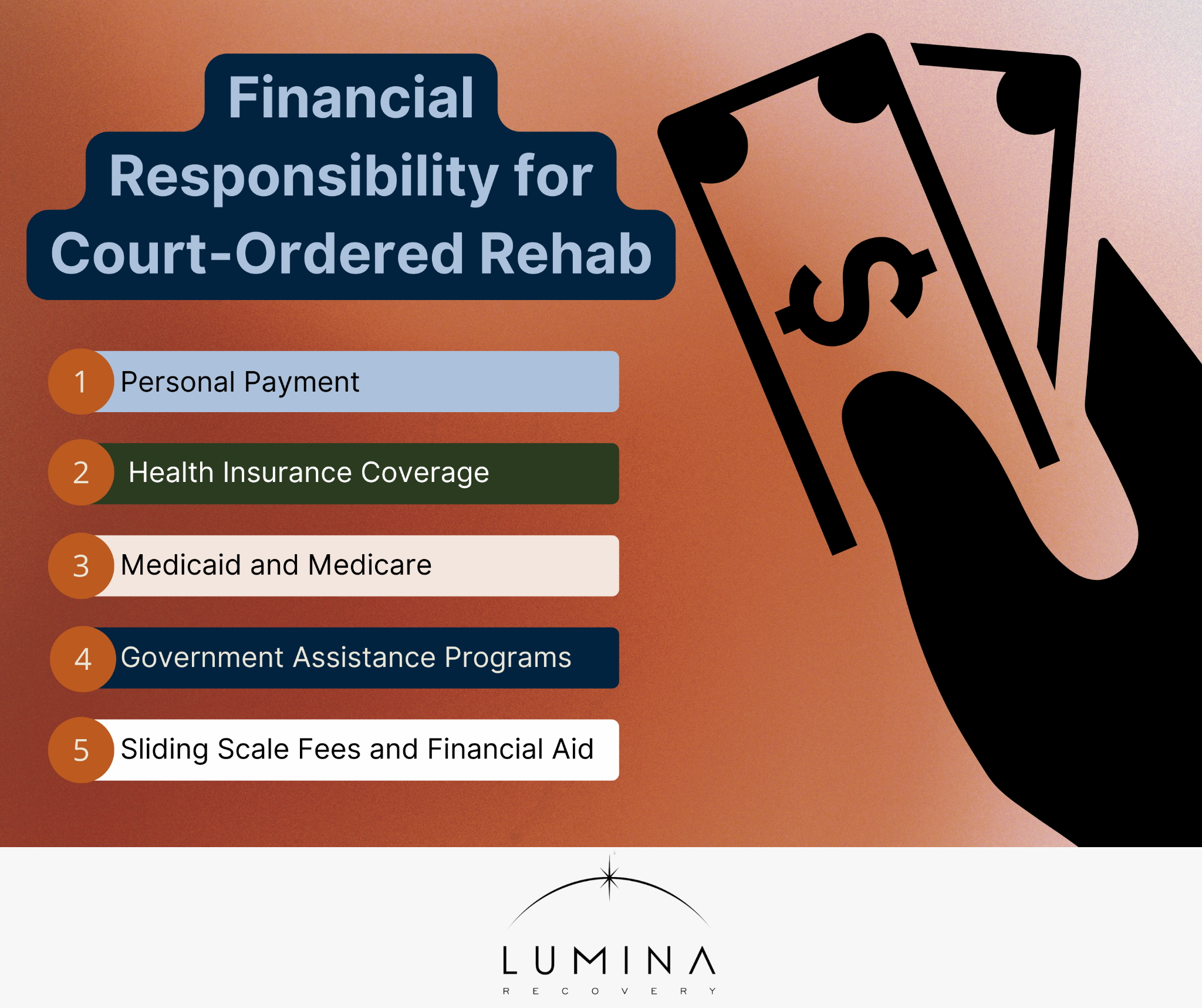Individuals facing court-ordered rehab are usually responsible for covering the costs. However, options such as health insurance, Medicaid, Medicare, and government-funded programs can help alleviate expenses.
The cost of court-ordered drug rehab varies depending on factors such as the type of facility, the level of care required, and state-specific policies. Understanding the financial responsibilities and available resources is crucial for individuals navigating this process.
Definition of Court-Ordered Rehab
Court-ordered rehabilitation is a legal requirement mandating individuals convicted of substance-related offenses to undergo treatment instead of, or in addition to, serving jail time.
These programs, often part of an alternative sentencing program, are designed to address addiction issues through structured interventions, helping individuals recover while reducing crime and repeat offenses.
The primary objective of court-ordered rehab is to promote rehabilitation over punishment. Many individuals struggling with substance use disorders benefit from professional treatment rather than incarceration.
By prioritizing recovery, these programs aim to lower recidivism rates, improve public safety, and support reintegration into society. In many cases, court-ordered drug rehab is a viable path toward lasting recovery and reduced criminal behavior.

Financial Responsibility for Court-Ordered Rehab
One of the biggest concerns for individuals facing court-ordered inpatient rehab is understanding who is responsible for covering treatment costs.
1. Personal Payment
In most cases, individuals are responsible for covering the costs of their court-ordered rehab. The expenses vary based on the type of treatment facility, the program duration, and the level of care required.
Court-ordered rehab is not always free, and defendants may need to make arrangements to ensure they can afford their treatment to remain compliant with legal requirements.
2. Health Insurance Coverage
Private health insurance plans often cover a portion of court-ordered drug rehab costs. Coverage specifics depend on the policy and provider.
Under the Affordable Care Act (ACA), substance use disorder treatment is considered an essential health benefit, meaning many plans offer some level of support. However, individuals should check with their insurer to determine what portion of their treatment may be covered.
3. Medicaid and Medicare
For individuals who qualify, Medicaid and Medicare may help cover the costs of court-ordered inpatient rehab.
- Medicaid is a state and federally funded program that provides coverage for low-income individuals, often including substance use treatment.
- Medicare is a federal health insurance program for individuals over 65 and those with disabilities that may cover certain rehab services, though eligibility and benefits can vary.
4. Government Assistance Programs
Some states offer government-funded court-ordered rehab programs to support individuals who cannot afford treatment. Grants, subsidies, and state-sponsored initiatives provide financial aid to ensure access to court-ordered rehab.
Availability depends on location and specific state policies. Some individuals may qualify for free or reduced-cost rehab through state-funded or non-profit programs.
5. Sliding Scale Fees and Financial Aid
Many court-ordered inpatient rehab centers offer sliding scale fees based on income. Individuals with limited financial resources can qualify for reduced-cost treatment through these programs. Some facilities also offer scholarships or financial aid to help cover expenses.
Impact of Facility Type on Costs
The cost of court-ordered rehab can vary significantly depending on the type of facility chosen.
- Inpatient rehab programs tend to be more expensive, as they include housing, meals, and intensive therapy. However, court-ordered inpatient rehab can provide a structured environment crucial for long-term recovery.
- Outpatient rehab programs can be more affordable than inpatient programs. Outpatient services allow individuals to receive treatment while continuing daily responsibilities. Many alternative sentencing program participants may be allowed to complete treatment in an outpatient setting to reduce costs.
- Public rehab centers are government-funded facilities that often provide low-cost or free treatment but may have limited availability and longer wait times.
- Private rehab centers are facilities that offer more individualized care and amenities but are typically more expensive. They may accept private insurance, Medicaid, or offer financial aid options.

How to Choose the Right Court-Ordered Drug Rehab
In most cases of court-ordered drug rehab, individuals are allowed to choose a rehab facility based on their specific needs and financial situation. While the court mandates treatment, individuals can often select a program that aligns with both their recovery goals and court requirements by considering the following factors:
- Type of Treatment: Determine whether inpatient or outpatient care is required based on the severity of addiction and court stipulations regarding the length of court-ordered drug rehab.
- Accreditation and Licensing: Ensure the facility is accredited and meets court-mandated treatment standards.
- Treatment Approaches: Look for evidence-based programs, such as CBT, DBT, and MAT, that provide structured and effective care.
- Specialized Programs: Some facilities offer dual diagnosis treatment for co-occurring mental health disorders, which may be beneficial for long-term recovery.
- Location and Accessibility: Consider whether a local or out-of-state rehab facility is best for focusing on recovery.
- Cost and Insurance Coverage: Verify what insurance plans are accepted and whether financial aid or sliding scale payment options are available.
Taking these factors into account can help individuals find a court-ordered inpatient rehab or outpatient program that aligns with their recovery needs and legal requirements.
FAQs
Who pays for court-ordered drug rehab?
Generally, individuals must cover the cost of court-ordered drug rehab. However, options such as insurance, government assistance, and sliding scale fees may help offset expenses.
Does health insurance cover court-ordered rehab?
Many health insurance plans include coverage for substance use disorder treatment, including court-ordered rehab. The level of coverage depends on the policy and provider.
What happens if someone cannot afford court-ordered rehab?
Individuals who cannot afford treatment can explore government-funded programs, financial aid, or facilities offering income-based pricing.
Are there free court-ordered rehab programs available?
Some state-funded programs and non-profits provide free or low-cost rehab services. Availability depends on location and individual eligibility.
Can court-ordered rehab be served at any treatment facility?
The court usually approves specific rehab facilities that meet legal and treatment standards. It is essential to confirm that the chosen rehab center is court-approved.
Find the Support You Deserve With Lumina Recovery
Understanding who pays for court-ordered drug rehab is essential for individuals required to attend treatment. While many must pay out of pocket, options such as insurance coverage, government aid, and sliding scale fees can help alleviate financial burdens.
At Lumina Recovery, we provide inpatient rehab for structured, 24/7 care and outpatient rehab for flexible support. We also offer dual diagnosis treatment for those with co-occurring mental health conditions to ensure a well-rounded recovery approach.
If you or a loved one needs support navigating court-ordered rehab, contact us today to explore your options and start your recovery journey.


